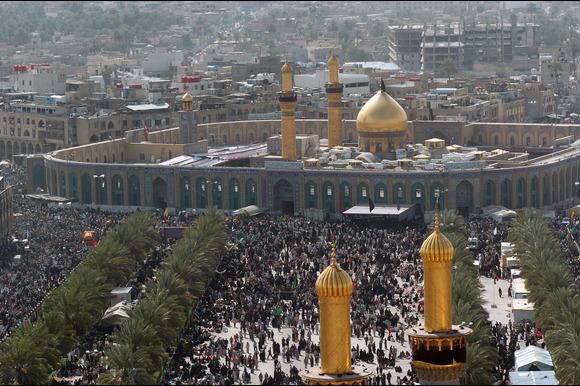ISLAMABAD: Interior Minister Syed Mohsin Naqvi announced on Sunday that Pakistani pilgrims intending to travel to Iran and Iraq for the Chehlum (Arbaeen) of Imam Husain will not be allowed to make the journey by road this year due to heightened security concerns. The decision follows a high-level meeting between the interior minister and Prime Minister Shehbaz Sharif.
Mr Naqvi revealed the development on social media platform X, stating that the federal government, after thorough consultations with the Ministry of Foreign Affairs, the Balochistan government, and national security agencies, had concluded that overland travel posed significant risks.
“After extensive consultations with the Ministry of Foreign Affairs, the Balochistan Government, and security agencies, it has been decided that Zaireen (pilgrims) will not be allowed to travel to Iraq and Iran by road for Arbaeen this year,” Mr Naqvi stated. “This difficult decision has been taken in the interest of public safety and national security.”
Each year, millions of pilgrims from around the world visit the Iraqi city of Karbala to mark the 40th day of mourning for the martyrdom of Imam Husain, the grandson of the Prophet Muhammad (PBUH). However, road journeys by pilgrims from Pakistan, especially through Balochistan, have in the past been marred by deadly terrorist attacks.
In light of the decision, Prime Minister Sharif has issued special directives to the national carrier Pakistan International Airlines (PIA) and the Aviation Ministry to facilitate pilgrims via air travel. The PM has ordered PIA to maximise flight availability and instructed Aviation Minister Khawaja Asif to arrange special chartered flights to both Iran and Iraq.
A press release from the Prime Minister’s Office confirmed the directives, noting that arrangements are being expedited to accommodate the anticipated increase in demand for air travel among pilgrims.
Additionally, the government announced plans to overhaul the travel management system for pilgrims, effective January 1, 2026. Under the upcoming framework, all pilgrimage journeys will be handled exclusively through licensed tour operators. The existing Salar System, traditionally used to manage pilgrim groups, will be phased out and replaced with a new Zaireen Group Organisers model.
To address immediate needs, weekly flights to Iran will be increased from six to 15, while 107 additional special flights are being scheduled to transport pilgrims to Iraq.
Earlier this month, confusion arose after Religious Affairs Minister Sardar Muhammad Yousuf stated that 40,000 pilgrims had not returned from visits to Iran and Iraq. He later retracted the statement, attributing the error to outdated and non-digitised records.
PIA Special Flights and Ticketing
Following the Prime Minister’s directives, PIA confirmed it would commence special flights to Iran and Iraq from August 8 to 11 to facilitate pilgrims travelling for Arbaeen. Return flights from Najaf have been scheduled between August 18 and 21.
The airline has begun ticket sales and reservations for these flights and indicated it may schedule additional services depending on market demand.
MWM Voices Strong Opposition
The government’s decision to restrict road travel has met with strong opposition from the Majlis Wahdat-i-Muslimeen (MWM), which has condemned the move as unjustified and unconstitutional. In a joint meeting held at Wahdat House on Sunday, MWM leaders at the provincial, divisional, and Azadari Wing levels unanimously rejected the travel ban.
The session was chaired by MWM Sindh President Allama Syed Baqar Abbas Zaidi and attended by senior leaders including Allama Sadiq Jafri, Razi Haider, and Allama Mukhtar Imami.
Speaking at the gathering, Allama Zaidi criticised the government for failing to ensure the safety of pilgrims, accusing it of using security concerns as an excuse to impose blanket restrictions. “Instead of providing protection to pilgrims, the state is admitting its inability and opting for bans,” he said, noting that Iraq and Iran are not war zones.
He further stressed that it is the state’s constitutional obligation to secure public travel routes, particularly for religious pilgrimages.
Allama Syed Ali Anwar Jafri, who heads MWM’s Azadari Wing, also lambasted what he described as the government’s “contradictory policies.” He argued that while officials claim to support and facilitate religious pilgrims, their actions—such as this ban—send a conflicting message.
“On the one hand, the government claims to facilitate pilgrims; on the other, it imposes arbitrary restrictions. This has severely damaged public trust in the government,” Jafri said.
The MWM has demanded the immediate revocation of the road travel ban and called on the government to fulfill its responsibility of ensuring safe passage for pilgrims. The group also warned that failure to withdraw the restrictions would result in a nationwide protest campaign over what it described as a deeply religious and sensitive issue.






